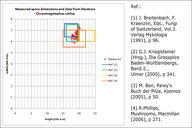|
|
click photo for larger file

Chroogomphus rutilus
Copper Spike
|
Photographer: Dr. Amadej Trnkoczy
ID: 0000 0000 0316 3687 (2016-03-31)Copyright © 2016 Dr. Amadej Trnkoczy
|
|
INFORMATION PROVIDED WITH THE PHOTO
|
date of photo Sep 19, 2009
latitude 46.37473 longitude 13.74063
View on Google Maps.
location
Lower Trenta valley, left bank of river Soča, southwest of village Trenta, downstream of Matoja Inn, East Julian Alps (Posočje, Slovenia)notes Slo.: bakreni polžar - syn.: Gomphidius viscidus (L.) Fr. - Habitat: sandy grassland; mixed broadleaved and conifer wood edge; Picea abies, Pinus sylvestris, Salix eleagnos in the vicinity; semiruderal, calcareous ground; flat terrain; dry, half sunny place; exposed to direct rain; average precipitations ~ 3.000 mm/year, average temperature 7-9 deg C, elevation 580 m (1.900 feet), alpine phytogeographical region. Substratum: soil. Comments: Croomogomphus rutilus is a quite common fungus in this region. Two other species Chroomogomhus helveticus and C. glutinosus grow in the same region. It is not always simple to tell them apart. C. glutinosus is normally very slimy and grows always under Picea abies while Croomogomphus rutilus grows only under two-needle pines. C. helveticus is rarely slimy but grows under Picea abies, two- and fife-needle Pinus species. Inamyloid hypha of the pileipellis is another more demanding distinguishing character. Spore dimensions are very similar of all three and hence of little help in discrimination. Different mycorrhizal partners also did not help in identification of this find since Picea abies and Pinus sylvestris (a two-needle species) were in the vicinity. Yet, characteristic copper tone of the pilei seems to be quite a reliable feature for Croomogomphus rutilus. Growing in small groups of a few fruit bodies and solitary; SP abundant, grayish-brown. Spores smooth. Dimensions 17,3 [18,5 ; 19,1] 20,3 x 5,8 [6,4 ; 6,6] 7,1 microns; Q = 2,6 [2,8 ; 3] 3,2; N = 24; C = 95%; Me = 18,8 x 6,5 microns; Qe = 2,9. Olympus CH20, NEA 100x/1.25, magnification 1.000 x, oil, in water, fresh material. AmScope MA500 digital camera. Ref.: (1) J. Breitenbach, F. Kraenzlin, Eds., Fungi of Switzerland, Vol.3. Verlag Mykologia (1991), p 96. (2) G.J. Krieglsteiner (Hrsg.), Die Grosspilze Baden-Württembergs, Band 2., Ulmer (2000), p 341. (3) M. Bon, Parey's Buch der Pilze, Kosmos (2005), p 50. (4) R.Phillips, Mushrooms, Macmillan (2006), p 271. (5) S.Buczacki, Collins Fungi Guide, Collins (2012), p 422.contributor's ID # Bot_380/2009_DSC4140 photo category: Fungi - fungi
|
MORE INFORMATION ABOUT THIS FUNGUS
|
| common names
Copper Spike (photographer)
View all photos in CalPhotos of Chroogomphus rutilus Check Google Images for Chroogomphus rutilus |
|
The photographer's identification Chroogomphus rutilus has not been reviewed. Sign in to review or comment on this photo |
|
Using this photo The thumbnail photo (128x192 pixels) on this page may be freely used for personal or academic purposes without prior permission under the Fair Use provisions of US copyright law as long as the photo is clearly credited with © 2016 Dr. Amadej Trnkoczy.
For other uses, or if you have questions, contact Dr. Amadej Trnkoczy amadej.trnkoczy[AT]siol.net. (Replace the [AT] with the @ symbol before sending an email.) |
|
|
